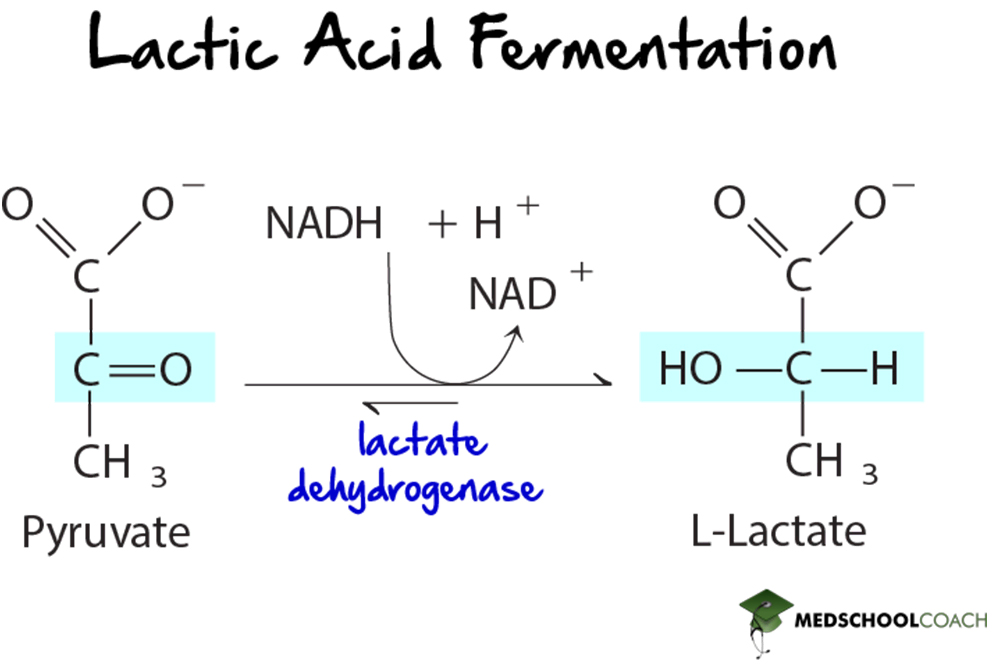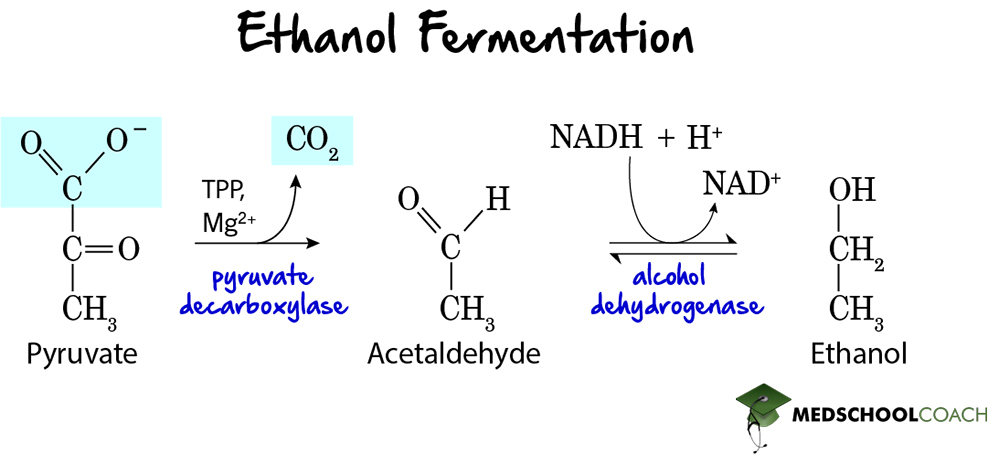Fermentation
MCAT Biochemistry Chapter 5 - Section 1.1 - Metabolic Pathways - Fermentation
- Home
- »
- MCAT Masterclass
- »
- Biological and Biochemical Foundations of Living Systems
- »
- Biochemistry
- »
- Fermentation – MCAT Biochemistry
Sample MCAT Question - Fermentation
Which enzyme catalyzes the conversion of pyruvate into lactate?
a) Pyruvate dehydrogenase
b) Lactate dehydrogenase
c) Malate dehydrogenase
d) Alcohol dehydrogenase
B is correct. Lactate dehydrogenase.
Lactic acid fermentation is an anaerobic cellular energy production pathway that is performed by muscle cells during periods of intense physical activity. During fermentation, pyruvate is reduced to lactate and NADH is oxidized to NAD+. This reaction is catalyzed by the enzyme lactate dehydrogenase. Answer choice A is incorrect, this enzyme catalyzes the conversion of pyruvate into acetyl-CoA and CO2. Answer choice C is incorrect, this enzyme is a part of the Krebs cycle. D is incorrect, this enzyme converts alcohols to ketones or aldehydes.
Get 1-on-1 MCAT Tutoring From a Specialist
With MCAT tutoring from MedSchoolCoach, we are committed to help you prepare, excel, and optimize your ideal score on the MCAT exam.
For each student we work with, we learn about their learning style, content knowledge, and goals. We match them with the most suitable tutor and conduct online sessions that make them feel as if they are in the classroom. Each session is recorded, plus with access to whiteboard notes. We focus on high-yield topics if you’re pressed for time. If you have more time or high-score goals, we meticulously cover the entire MCAT syllabus.
Overview of Fermentation
Fermentation is the anaerobic degradation of glucose to produce ATP. Interestingly, fermentation is considered the oldest metabolic pathway, as it is suitable for environments that did not have oxygen yet. By contrast, in aerobic respiration (which includes the Krebs cycle and the electron transport chain), glucose is broken down in the presence of oxygen to form ATP. In particular, the role of oxygen in aerobic conditions is to serve as the final electron acceptor in the electron transport chain. In this way, oxygen helps to regenerate NAD+ from NADH, which are then shuttled to the glycolytic pathway. However, in anaerobic conditions, NAD+ must be regenerated in the absence of oxygen, therefore, a molecule other than oxygen must serve as the final electron acceptor.
Lactic Acid Fermentation
There are two different types of fermentation – lactic acid fermentation and ethanol fermentation. Lactic acid fermentation is performed by muscle cells during periods of vigorous physical activity. During these activities, oxygen is used up so quickly that cells are under hypoxic conditions. In such conditions, cells have to undergo fermentation in order to produce energy to maintain the activity. Furthermore, in fermentation, pyruvate serves as the final electron acceptor. Figure 1 illustrates the process of lactic acid fermentation in which pyruvate is reduced to lactate and NADH is oxidized to NAD+.
Lactic acid fermentation is catalyzed by the enzyme lactate dehydrogenase. The NAD+ regenerated from this reaction can then be used in glycolysis, contributing to the break down of glucose to pyruvate and ATP production. The lactate produced is released into the blood or converted back to glucose by the liver.

Ethanol Fermentation
Ethanol fermentation is performed by yeast cells to regenerate NAD+ and occurs in two steps (Figure 2). First, pyruvate is broken down to acetaldehyde by pyruvate decarboxylase in a decarboxylation reaction. Then, alcohol dehydrogenase catalyzes the reduction of acetaldehyde to ethanol and the coupled oxidation of NADH to NAD+. In this way, NAD+ is regenerated in order to be used in glycolysis. Ethanol fermentation can be used in a variety of ways, such as producing alcoholic drinks, like wine or beer, production of ethanol fuel, or even for baking bread.

Explore More MCAT Masterclass Chapters
Take a closer look at our entire MCAT Masterclass or explore our Biochemistry lessons below.

One-on-One Tutoring
Are you ready to take your MCAT performance to a whole new level? Work with our 99th-percentile MCAT tutors to boost your score by 12 points or more!
See if MCAT Tutoring can help me
Talk to our enrollment team about MCAT Tutoring

MCAT Go Audio Course
Engaging audio learning to take your MCAT learning on the go, any time, any where. You'll be on the way to a higher MCAT score no matter where you are. Listen to over 200+ lessons.

MCAT Practice Exams
Practice makes perfect! Our mock exams coupled with thorough explanations and in-depth analytics help students understand exactly where they stand.

MCAT Prep App
Access hundreds of MCAT videos to help you study and raise your exam score. Augment your learning with expert-created flashcards and a question banks.